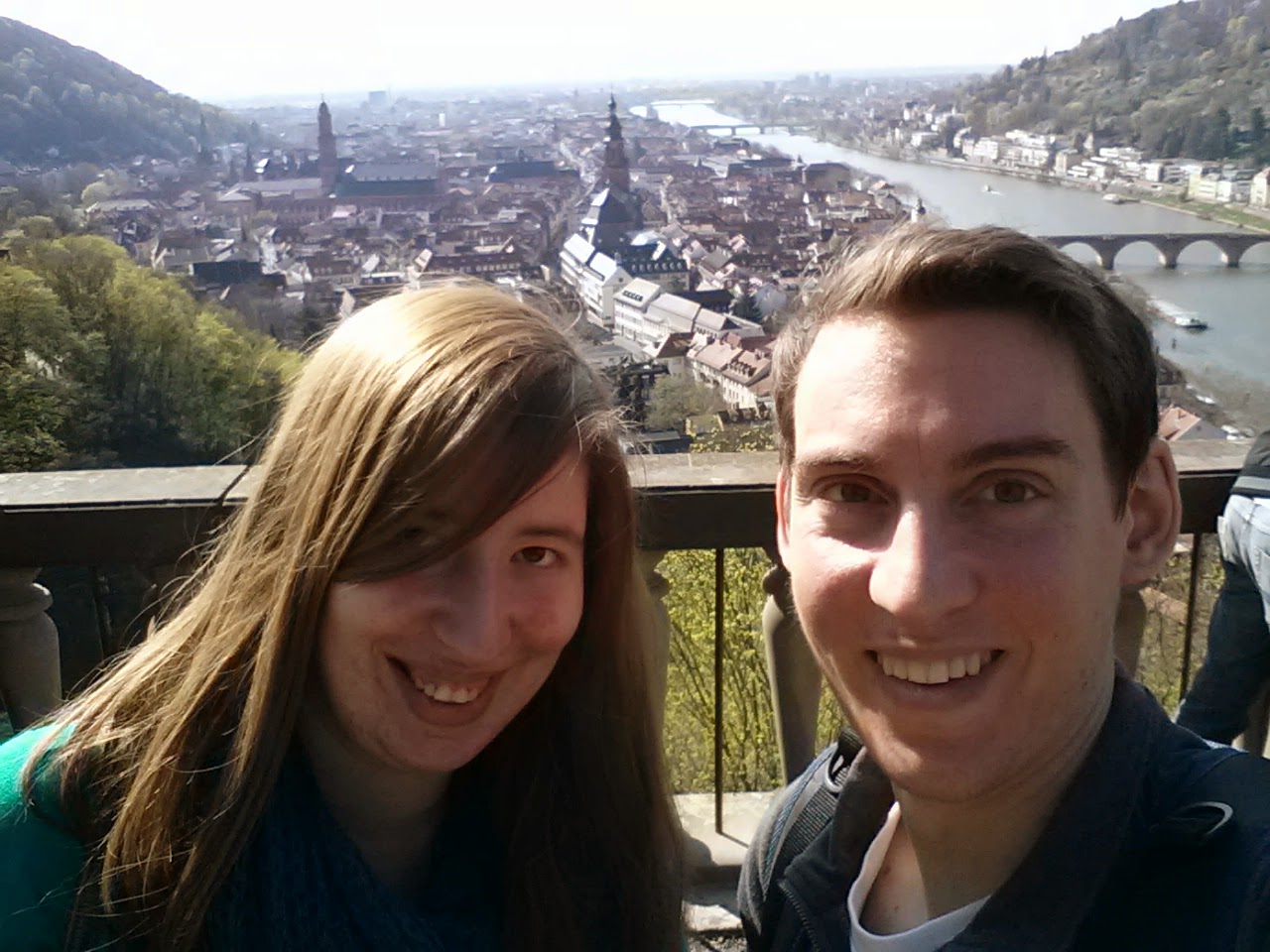 |
| Champignon Mushrooms in an Herb Sauce |
 |
| Fried Zucchini with Tsatziki |
 |
| Typical Dinner |
 |
| Rhubarb Cake with Icing |
Now that I'm back in Freiburg, I've made some traditional German meals myself, such as Kartoffelpuffer and Semmelknödel, and some more exotic dishes such as Fattoush. The recipes are fairly simple; you can find them below.
------------------------------------------------------------------------------------------------------------
Semmelknödel (Breaded dumplings)
 In a medium sized bowl, mix the semolina and broth well and let stand for ca. 5-10 minutes. In a large bowl, mix all other ingredients. After letting the semolina mix stand, fold it into the other mixture and combine thoroughly.
In a medium sized bowl, mix the semolina and broth well and let stand for ca. 5-10 minutes. In a large bowl, mix all other ingredients. After letting the semolina mix stand, fold it into the other mixture and combine thoroughly.
Ingredients
1-2 eggs
100 g Flour, and a bit extra
250 g Semolina*
200 g bread crumbs**
200 g ham bits***
an onion, finely chopped
chicken/beef/vegetable broth/stock
salt and pepper to taste
* Semolina is important for the consistency and texture of the dumplings
** It's best to use stale bread - it tastes better and it has very few other purposes
*** We don't quite have an exact equivalent to Speckwürfel in America - or at least, it's hard to find. Here is what it looks like:
I think the best substitute is lightly cooked ham, which you then break into small pieces. Bacon bits could also work as well.
Directions
 In a medium sized bowl, mix the semolina and broth well and let stand for ca. 5-10 minutes. In a large bowl, mix all other ingredients. After letting the semolina mix stand, fold it into the other mixture and combine thoroughly.
In a medium sized bowl, mix the semolina and broth well and let stand for ca. 5-10 minutes. In a large bowl, mix all other ingredients. After letting the semolina mix stand, fold it into the other mixture and combine thoroughly.
Start heating a large pot of water in which you can imagine 4-5 fairly large dumplings can swim around comfortably. Next roll the dough into fairly large balls, coating them with flour as necessary. When the water has started boiling, place the dumplings in the pot and cook them for approx. 15 minutes, stirring occasionally. After 15 minutes, they should be ready to enjoy with some herb sauce, Quark and some potato salad.
-----------------------------------------------------------------------------------------------------------
Kartoffelpuffer (Potato pancakes)
Ingredients
1 kg potatoes
1 onion
1-2 eggs
100 g Flour
oil/butter
salt to taste
Directions
Peel the potatoes and then grate the potatoes into a large bowl. Then grate the onion into the bowl. Be warned: you will cry; it's even worse than cutting onions! Add the flour, salt and egg and mix thoroughly.
Heat a pan with oil or butter over medium heat. Then cook the potato pancakes for about 2 minutes on each side, until browned, much like you'd cook a pancake. These are traditionally served with Kräuterquark (Quark mixed with various greens and herbs), or with apple sauce.
 |
------------------------------------------------------------------------------------------------------------
Fattoush - Lebanese Salad
Ingredients
1 head of lettuce
2 slices pita bread
3 large tomatoes, chopped into quarter size pieces
1 cucumber, chopped
2-3 radishes, chopped
2-3 scallions, chopped
1/4 cup of mint
1/2 cup fresh parsley
olive oil
tablespoon sumac*
Dressing
teaspoon sumac*
juice from 1 lemon
1/4 cup olive oil
* sumac is a reddish purple powdery spice found in any Middle Eastern market.
Directions
Preheat oven to 200 degrees Celsius (approx. 390 degrees F). Cut pita bread into small strips, coat with oil and place generously on a cookie sheet. Bake for approx. 10-15 minutes, until slightly browned and crispy. Mix all other salad ingredients and then top with toasted pita bread. Top with sumac dressing and enjoy.
------------------------------------------------------------------------------------------------------------
Yogurt with Honey & Raspberries
This is a really simple and tasty breakfast that's perfect when you're feeling too lazy to make yourself a meal but you still want something with substance. Just mix liquid honey with yogurt and top with nutmeg, cinnamon and raspberries - or whatever other fruit you'd enjoy.
------------------------------------------------------------------------------------------------------------
Almond-cranberry Sauce over Brie
This is a really simple appetizer that has never failed to impress people before. I've made something very similar to this is the states, so I thought since Massachusetts is well-known for its cranberries, it would be a good dish to introduce to some of my German friends. Of course, I used cranberries that were likely imported from eastern Europe, where production is also very high and where the cranberries have a slightly different taste.
Ingredients
1 block Brie
100 g almonds
200 g cranberries
raspberries to top
Directions
Preheat oven to around 175 degrees Celsius (350 fahrenheit). Bake brie in a baking pan for just under 10 minutes, so that the cheese is soft but has not yet started to melt. Remove from the oven and top with cranberries. Continue baking for another 5-6 minutes, then remove from oven and add the almonds and raspberries. Keep warm and serve it with some crackers.









































